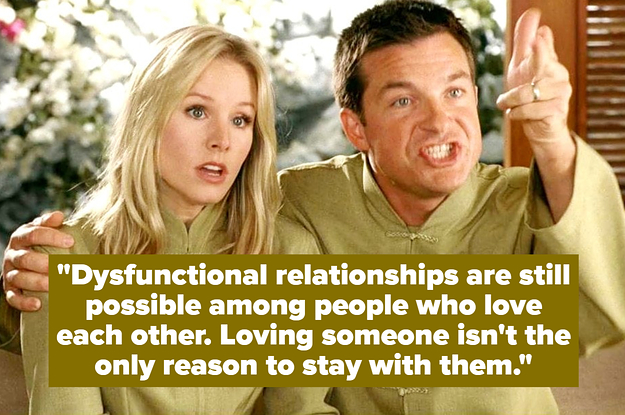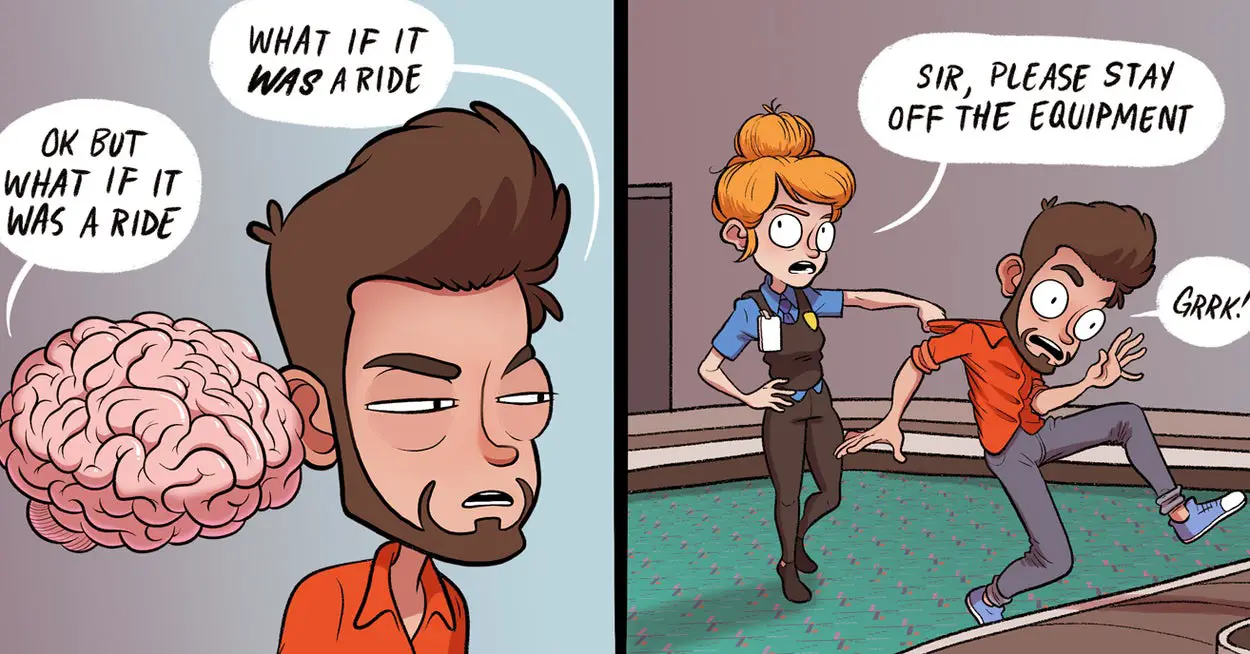We all know the story: When you’re in a relationship, it’s easy to spot (or deny) any red flags in the name of love. But for trained professionals — like experienced couples therapists — they’re often a lot more obvious, and it’s a bit easier to predict how the relationship will turn out.
So, u/Gnerdy asked, “Couples therapists, without breaking confidentiality, what are some relationships that instantly set off red flags, and do you try and get them to work out?” Many couples therapists came forward with insightful responses, so here they are:
1. “Any kind of display of humiliating the other is never a good sign. That might be an obvious statement, but I mean it in a more subtle sense. If these behaviors are displayed in sessions, it paints a good picture of how they really are at home. For example, a client would always make comments about his wife and her makeup being messed up or her mispronouncing a word. Instead of politely telling her that her mascara was messed up or letting the mispronunciation go, he would make a point to laugh and correct her in a demeaning way. Even though he was smiling and it came across as harmless, his need to point out her flaws in front of others was an act of humiliation and control.”
2. “Overbearing parents and in-laws. When a spouse is more allied with their parents and calls them on speakerphone for fights, or when a spouse often speaks ill of their partner to their parents, I usually see these couples stay very unhappily married for years. It’s sad.”
“I understand there’s a ton of cultural nuance here, and I work with couples who have arranged marriages, as well as the South Asian community.”
3. “When one person is entirely dependent on the other, especially at a relatively young age — I mean financially and emotionally.”
“These are typically young women (sometimes, young men, as well) who do not work, do not have children, stay home all day, and have no friends or hobbies outside of hanging out with their spouse. Very unhealthy, and a huge red flag. Always ends in a painful and messy breakup.
Generally, we try to get them to find a friend, join a community, get a job, or volunteer — something to provide them with self-worth and personal fulfillment outside of their spouse.”
4. “Couples in a tit for tat arrangement. For example, ‘I cheated, so you can have one night to cheat with whomever.'”
“Or, ‘I violated your trust and did drugs; you can go out and do whatever for one night.’ It erodes trust and compounds the hurt.”
5. “When I see a couple in which one or both of the members are seeking to change something fundamental about the other person.”
“We process where the need for the change comes from, and the person with the issue evaluates whether it’s a dealbreaker for them or not. We work on acceptance and tolerance of others. I also recommend my couples are also in individual therapy on their own.”
6. “‘We’re staying together for the kids.’ It leads to an unhealthy mindset where the couple sees the children as a burden and believes that by remaining in an unhealthy relationship, it will somehow make the kids turn out alright.”
“Kids are smarter than you think, and if mom and dad don’t love each other, they’ll pick up on it. If the kids are really the priority, either learn to fix the relationship or end it.”
7. “People who approach therapy with the idea that they must convince the therapist that they’re right and their partner is wrong.”
8. “One of the biggest red flags I see when working with a new couple is when they’ve totally forgotten the good. Part of relationship therapy is reconnecting a couple with what they like about each other, what initially attracted them to each other, and what the positives are between them.”
“When people come in and they’ve been so unhappy for so long that they actually can’t remember what it was like to be in love or to even like each other, they’re just about hopeless.
You don’t have to be happy for therapy to work — but if you can’t even reminisce about the good times, then the good times are probably over.”
9. “Contempt. When I experience true contempt from one in the relationship, I know it is usually over.”
“Look toward a peaceful ending at that point if possible.”
10. “Boundary violations. Testing boundaries a little bit is okay, but repeatedly violating boundaries is a big red flag. Folks, knowing your boundaries, knowing how to set them, and knowing how to maintain them are so very important to your own personal wellbeing. Also, learn how to respect other people’s boundaries. Boundaries don’t have to be permanent; they can change, but they can change because someone has earned it or lost it.”
11. “Constant, needless escalation. When ‘I don’t think we need this expensive thing’ is escalated to ‘You don’t really love me’ — major problem.”
“Mostly because the one using this to avoid accountability is almost guaranteed to play this card in relation to the therapy itself, either ‘I had to drag them here’ or ‘They’re just trying to break up with me.’
What they’re doing is avoiding conversation about the issue by blowing it up into a bigger problem than it is, so they can make the other person respond to their feelings rather than dealing with their concerns.”
12. “Active independence from each other is my #1 sign of ‘this marriage is about to spiral downward.'”
“As soon as I realize a couple is doing things separately, like applying for car loans without the other’s knowledge or planning personal trips without consulting the other, I know that the couple is soon doomed.”
13. “If someone discourages you from spending time with friends, family, or other loved ones, or if someone rewards you for not seeing or talking to loved ones, that’s a red flag. Isolation is a common tactic of abusive individuals. More generally, be aware of anyone who tries to control where you go, who you see, or what you do. A relationship that is built on trust and mutual respect won’t include restricting one another.”
14. “Attributing problems to the partner’s character flaws or personality (like saying something’s because ‘they’re lazy’) rather than a certain behavior is a red flag. Another red flag is malicious attributions (thinking one partner did something on purpose to hurt the other).”
15. “Invalidation. This comes in many forms, from gaslighting to just simple denial of another’s opinion. Most of the time, one or both parties are simply trying to be heard on an emotional level with an event or topic that was brought up, but the other party takes this as a personal attack on their ideals.”
“We’ve all heard of or know people who will literally disagree with anything you say simply because you said it. That’s the invalidation I’m referring to.
Attack the problem, not each other. People rarely have the exact same stance in a conflict, but they usually (in healthy relationships) have very similar core values. While two parents may disagree on how to parent a child (authoritarian vs. authoritative, for example), the core value of caring about their children and wanting them to succeed is often the same. By determining they are within the same realm of issue, two parents with different ideals can see themselves as allies in a conflict rather than enemies.”
16. “When a partner raises an objection to meeting with me individually. During the first session, I share that during assessment, I like to meet with them both together and once each individually.”
“Occasionally, I’ll have partners who suddenly become very critical or suspicious about this. Asking why I’d do that, and is it ethical, and the classic, ‘I’ve never heard of a marriage counselor doing that before?!’
It goes beyond curiosity or simply inquiring about practice. There is an incredulous and almost panicked tone to it. And sure enough — Every. Single. Time. — they turn out to be some variation of controlling, manipulative, abusive.”
17. “When one spouse has a close relationship with a member of the opposite sex who doesn’t like the other spouse — the ol’ ‘they’re just a friend.'”
18. “In my experience, strong and healthy relationships are built on two very important qualities: trust and respect. Love is not included in these qualities, because love is not a determiner of a strong or healthy relationship.”
“Dysfunctional relationships are still possible among people who love each other. And loving someone isn’t the only reason to stay with a person. Many of the clients that I’ve worked with in the past, who are in very dysfunctional relationships, have actually stayed solely because of love but continue to struggle in those relationships because they lack trust and respect.
Without respect and trust, most relationships are doomed to struggle or fail. For the couples that I’ve worked with, I always assess whether or not trust and respect are present. And then, I build treatment goals around seeing if it’s possible to develop those qualities. If they are not willing or able, then, in most cases, those relationships are likely to end.”
19. “What-aboutism. Instead of taking ownership and responsibility for their contribution to the degradation of the relationship, one or both parties simply point out an example of the other exhibiting a similar behavior. It’s a red flag because it illustrates their lack of self-awareness and poor communication skills.”
“Communication is key when trying to mend a tattered relationship because without respectful communication, the conflict-recovery process can never begin. In the conflict-recovery model, both parties agree to the terms under which they will communicate (no yelling, no interrupting, no I told you so’s, etc). Each party gets a chance to share how the other’s actions make them feel.
After, they each propose their solutions and identify where they made assumptions or where they got triggered and why. They then identify where they’re willing to compromise. Next, we create an actionable plan with deadlines, and we monitor the progress to see if the proposed solutions were effective.
IMO, everything can go to shit, but once communication stagnates, you’re in real trouble. So, even if you’re arguing, you’re still doing okay — you just need to work on how you’re communicating.”
20. “Triangulation of the kids. Oftentimes, kids will show symptoms because they’re subconsciously trying to even out the imbalance between the parents, so I will see a family for therapy and immediately recognize that the issue is not so much with the kids but the way the parents communicate. Helping them structure themselves and get the power back into their hands by getting them on the same page often helps the kids adjust and cope. Imagine getting inconsistent consequences from your parents all the time, so you don’t know when you’ll get in trouble and when you won’t. You’d get hyper-vigilant, or perhaps, you’d just give up and start doing things your way. Either way, you’re trying to understand a situation that you can’t control, so of course, you’re going to start acting weird or misbehave.”
“Now, imagine if your parents set consistent rules for you and gave you the choice to behave or misbehave and receive a predictable, reasonable consequence. You’re going to know where you stand and be less anxious because you feel in control.”
21. “A big red flag is how they cycle through arguments. If they always build tension, have a big explosion, and then a honeymoon phase — that’s a hard cycle to break out of and sometimes results in physical violence.”
22. “It’s very easy to work out when one person knowingly prioritizes their own wants and needs over their partner’s. Relationships like this are often doomed because the person simply doesn’t care enough to make any meaningful change.”
23. “Micro-controlling behaviors in a session are red flags — for example, one partner is constantly interrupting or correcting the other partner (e.g. ‘You’re wrong, what happened really was…’).”
24. “When one party, after numerous sessions, is still hyper-focused on content rather than process, [e.g.] who did what, when, and to whom, or who said what and how they said it, etc. In my experience, this has almost always foreshadowed more serious control issues that come out later on. We, as therapists, have to remain reasonably unbiased as to what a couple should do — break up or stay together — but I have certainly given one partner a look that indicates that I empathize deeply with their frustration or a look of deep concern for their wellbeing.”
25. “Being unable or unwilling to compromise or concede points for the betterment of the relationship. For example, at some point in a long-standing argument, in which neither party is willing to concede, a compromise is needed. When the same person in the relationship is always hellbent on being right all the time, that’s a red flag. Most couples understand the importance of compromise. So, if there is a partner who only thinks about themselves and how important it is for them to be right, that’s a major issue. That either means that the person isn’t thinking about how this is also an important point for their partner or, even worse, doesn’t care.”
26. “As a clinical psychologist, I focused mainly on behavioral medicine and cognitive assessment but did my fair share of couples work. Refusal or inability to compromise is a ginormous red flag — one that, I believe, is empirically validated. Compromise is a significant predictor of satisfaction in relationships, and it plays an important role in the long-term success of marriages and relationships in general.”
27. “When a partner responds to every criticism with, ‘I do it because I love you!’ Examples: I micromanage how you do household chores because I love you and want you to know how to do it right. I mock and belittle you because I love you and want you to see how silly you’re being. I’m overbearing and don’t let you do things for yourself because I love you and don’t trust you to do it right. I cross every boundary you set because I will do literally anything for the people I love. More often than not, ‘I’ll do anything for love’ isn’t a badge of honor, proof, or dedication. It’s a lack of healthy boundaries.”
28. “I’m a therapist who’s newer to couples counseling, but one of the flags I’ve seen is one person digging their heels in and not accepting any feedback or suggestions, then telling me and their partner that they are ‘trying.'”
“In one case, I called them out on it and said that they needed to evaluate what they’re willing to do and not do. Needless to say, I didn’t hear back from them.”
29. “An unofficial litmus test is when I ask at some point in the first few sessions how the couple met.”
“If there is absolutely no positive effect from either person — no one even cracks a smile, or they just give me a single-sentence answer (‘We met at a party’) — that’s usually a signal they’ve been so unhappy so long, or the conflict is so overwhelming that they can’t access those good warm fuzzy feelings from the beginning.”
30. “Don’t go to couples counseling if your partner is abusive. It doesn’t work. It won’t work. You will give the other person the tools and language to make you feel even worse, and there will be heavy retaliations at home if you reveal the truth. Go by yourself if you know or suspect abusive markers in your relationship.”
31. “Withholding affection in order to get their partner to ‘see how it feels’ when their feelings get hurt.”
“I take a very direct approach in therapy, so yes, I do try and get them to work it out by calling it as I see it.”
32. “As a therapist, it’s not my place to try to get them to reunify. That takes their power and gives it to me. Instead, I teach them the skills to make their own informed decision. That being said, whenever one-half of the couple comes in and says they’re there because their spouse made them come, it’s pretty rare that they decide to stay together.”
33. “A family that presents everything as alright. That’s a red flag. Almost everything is certainly not alright even in the most functional relationships. In fact, it’s one of the most commonly mis-held [sic] beliefs that there exist perfect relationships.”
“I do try to get them to work it out, but that’s all dependent on what they think, feel, and want to happen. Sometimes, it’s just helping them realize what they want.”
34. “Separating without a plan. All that’s going to do is teach you how to live without each other. I would ask them, ‘Okay, how do you know when the separation works?’ Typically, I’d hear, ‘I don’t know, when I start missing them, I guess.'”
35. “If either partner rolls their eyes when the other is talking or sharing. It’s quick to notice and shows a lack of respect for the other partner’s feelings. It’s one of the easiest and most reliable ways to see a relationship won’t last. Of course, it is a sign of an unhealthy underlying dynamic — eye-rolling in itself is not dangerous.”
36. “Sexual boundaries — one litmus test: Does this person ascribe to the following definition of sexual consent? An ongoing, affirmative agreement between two or more people who are sober, cognitively and legally able to provide consent, and under no duress, explicit or implicit. That agreement is to engage in specific actions and is specific to that time and place. If someone wants to do something different or additional, it requires obtaining consent for the change or addition.”
“Explicit duress is something like, ‘Do this, or I’ll kill you,’ whereas implicit duress is something like, ‘If you don’t do what I want, you’ll get a bad grade/job review/kicked out of your residence, etc.).”
37. “I’ve had a few clients who had kids because it would ‘bring them together.’ That’s definitely a red flag. As far as getting them to work it out, it’s complicated. I want what is healthy for my clients, but they have their own autonomy and are (obviously) free to do as they please.”
“My personal feelings on the matter shouldn’t be a factor when working with a couple, which can make staying objective hard. Sometimes, it’s difficult to follow that.”
38. “If a client is in one-on-one therapy and starts doing/feeling better, there is a strong likelihood that their partner will not appreciate the changes and try to get them to either stop therapy or abuse/neg them in order to maintain the previous (unhealthy) status quo. If the partner who’s not in therapy isn’t willing to accept changes for the better, this is a big red flag, because it means the relationship was based on an unhealthy foundation and likely won’t work out.”
Have you noticed these red flags in relationships you’ve been in or witnessed them in others? Alternatively, what red flags do you actively look out for in relationships? Share in the comments below.
If you or someone you know is in immediate danger as a result of domestic violence, call 911. For anonymous, confidential help, you can call the 24/7 National Domestic Violence Hotline at 1-800-799-7233 (SAFE) or chat with an advocate via the website.
If you are concerned that a child is experiencing or may be in danger of abuse, you can call or text the National Child Abuse Hotline at 1-800-422-2253 (4.A.CHILD); service can be provided in over 140 languages.










